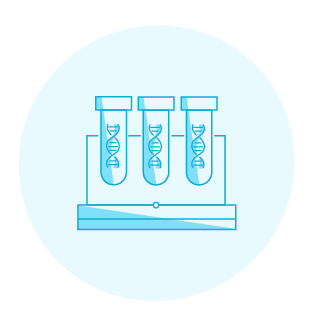What is Metabolic Genetics?

Metabolic diseases span a vast range of conditions. Inherited metabolic disorders have a defective gene that results in an enzyme deficiency. Metabolic disorders include cystic fibrosis, phenylketonuria (PKU), hyperlipidemia, etc. Inborn Errors of Metabolism (IEM) comprise a group of disorders in which a genetic defect causes a clinically significant block in a metabolic pathway. This results either in an accumulation of substrate behind the block or deficiency of the product. Most metabolic disorders are genetic in origin. While metabolic disorders are individually rare, collectively they affect 1% to 3% of the world population.1 in 1000 infants are known to inherit a metabolic disorder, which therefore creates a health burden in the society. The onset of symptoms could be sudden or could progress slowly. Symptoms may be brought on by foods, medications, dehydration, minor illnesses, or other factors. Symptoms of several metabolic conditions appear within a few weeks of birth. Other inherited metabolic disorders might take years to develop. Many individual disorders have clinical presentations that initially seem very similar to one another. All IEMs are all genetically transmitted typically in an autosomal recessive or X-linked recessive fashion.

Prevalence
In India, the prevalence of Inborn errors of metabolism (IEM) is 1 in 2,497 newborns. Worldwide, the incidence of IEM is more than 1/1000.
What are the common Genetic Metabolic Disorders?
The major categories of Inborn Errors of Metabolism are:
Aminoacidopathies are a very heterogeneous group of disorders such as:
- Phenylketonuria
- Hereditary tyrosinemia
- Non-ketotic hyperglycinemia
- Maple syrup urine disease
- Homocystinuria
Organic acidemias are caused by abnormal metabolism of proteins, fats, or carbohydrates. They are characterized by marked metabolic acidosis with ketosis, often with elevated lactate, and mild to moderate hyperammonemia. Some types of organic acidemias are:
- Methylmalonic
- Propionic acidemia
- Multiple carboxylase deficiency
Fatty acid oxidation defects, also known as Beta-oxidation defects, are characterized by hypoketotic hypoglycemia, hyperammonemia, and cardiomyopathy. Medium-chain acyl-CoA dehydrogenase deficiency (MCAD) is among the most common of all IEMs and can account for 5% of Sudden Infant Death Syndrome (SIDS) cases. Examples of Fatty acid oxidation defects are short, medium, and long-chain acyl-CoA dehydrogenase deficiency.
Primary lactic acidosis is accompanied with severe lactic acidosis. Types of primary lactic acidosis are:
- Pyruvate dehydrogenase
- Pyruvate carboxylase and cytochrome oxidase deficiencies
Urea cycle defects result from the inability to detoxify nitrogen. They are characterized by severe hyperammonemia and respiratory alkalosis, with a typical onset after 24 hours of age. A few types of urea defects are:
- Citrullinemia
- Ornithine transcarbamylase deficiency
- Arginosuccinic aciduria
Disorders of carbohydrate metabolism are a heterogeneous group caused by the inability to metabolize specific sugars, aberrant glycogen synthesis, or disorders of gluconeogenesis. They may manifest with hypoglycemia, hepatosplenomegaly, lactic acidosis, or ketosis. Some types of disorders of carbohydrate metabolism are:
- Galactosemia
- Hereditary fructose intolerance
- Fructose 1,6-diphosphatase deficiency
- Glycogen storage diseases
Lysosomal storage disorders are caused by the accumulation of glycoproteins, glycolipids, or glycosaminoglycans. These disorders are usually detected later in infancy, not with a specific laboratory abnormality, but with organomegaly, facial coarseness, and neurodegeneration. These disorders show a progressively degenerative course. Some types of lysosomal storage disorders are:
- Mucopolysaccharidosis
- Tay-Sachs
- Niemann-Pick disease
- Gaucher’s
Peroxisomal disorders result from the failure of the peroxisomal enzymes. They may present with features similar to the lysosomal storage disorders. Some examples of peroxisomal disorders are:
- Zellweger syndrome
- Neonatal adrenoleukodystrophy
Some other disorders of genetic metabolism are:
- Disordered Steroidogenesis (congenital adrenal hyperplasia or SmithLemli-Opitz)
- Disorders of Metal Metabolism (Menkes syndrome, neonatal hemochromatosis)
Why do you need to test for Genetic Metabolic Disorders?

Early diagnosis of metabolic disorders can lead to better cost-effective management of disease conditions. For example, arginine must be supplemented in the diets of individuals with certain urea cycle disorders because their body produces insufficient amounts. In the case of PKU, it is advised to eat a special diet that limits foods containing phenylalanine and avoiding high protein content foods.
When do you need to get tested for Genetic Metabolic Disorders?
Most genetic metabolic disorders have no specific clinical appearances, and their clinical manifestations are highly complex and variable. Some of the commonly seen symptoms are:
- Weight loss
- Failure to gain weight or grow
- Lethargy
- Poor appetite
- Abdominal pain
- Vomiting
- Jaundice
- Seizures
- Developmental delay
- Coma
- Abnormal odour of urine, breath, sweat, or saliva
Who needs to get tested?
Individuals presenting with the symptoms of metabolic disorders.
Why recommend Actia for patients with Genetic Metabolic Disorders?
Actia offers a broad range of pre-designed gene mutation panels which have been developed with an in-depth understanding of genetic disorders by incorporating the latest research in this domain. New updated technologies, helpful customer service, and clear result interpretation along with counselling sessions with our expert genetic counsellors equip us to provide you the best available support for your patients and families with Genetic MetabolicDisorders. Actia offers the following metabolic gene panel tests
- Congenital Adrenal Hyperplasia CYP21A2 (21-0H) Deletion/Duplication Analysis
- Congenital Adrenal Hyperplasia CYP21A2 (21-0H) Gene Analysis
- Congenital Hypopituitarism Gene Panel
- Maturity-Onset Diabetes of the Young (MODY) and Neonatal Diabetes Gene Panel
- Kallmann Syndrome Gene Panel
- Citrullinemia Gene Panel
- Fatty Acid oxidation Disorders Gene Panel
- Mucopolysaccharidosis Gene Panel
- Peroxisome Assembly Disorders (Hepatomegaly and Cholestasis) Gene Analysis
- GLUT1 Deficiency (SLC2A1) Deletion/Duplication Analysis
- Glycogen Storage Disorder Gene Panel
- Lysosomal Disorders Gene Panel
- Metabolic Liver Disorder Gene Panel
What are the test methodologies?
1. Next-generation Sequencing (NGS) Using genomic DNA extracted from blood, the coding regions of all the genes are captured and sequenced simultaneously by NGS technology on an Illumina platform. The sequence data that is generated is aligned and analyzed for sequence variants. 2. Multiplex Ligation-Dependent Probe Amplification (MLPA) Deletion and duplication analysis of genomic DNA is carried out by MLPA. This method allows for the amplification of multiple targets with only a single primer pair. 3. Fragment Analysis PCR for Repeat Expansion Analysis These rely on the detection of changes in the length of a specific DNA sequence to indicate the presence of repeat expansions.
Test sample requirements
 Blood (3-5ml in EDTA tubes)
Blood (3-5ml in EDTA tubes)
Required forms
- Relevant clinical information including all the clinical presentations and symptoms
- Test request form
Turn around time (TAT)
- 21 Working Days for NGS
- 14 Working Days for MLPA
- 21 Working Days for Sanger Sequencing
- 7-14 Working Days for Fragment Analysis
 Extracted DNA samples (1µg high-quality DNA)
Extracted DNA samples (1µg high-quality DNA)
GET GENETIC COUNSELLING

Actia offers all your patients pre and post-test genetic counselling with our expert and certified genetic counsellors. Actia provides the best available support for your patients and families with
- Latest technologies
- Helpful customer service
- Clear result interpretation
- Counselling sessions with our Genetic Counsellors


 Enquire
Now
Enquire
Now